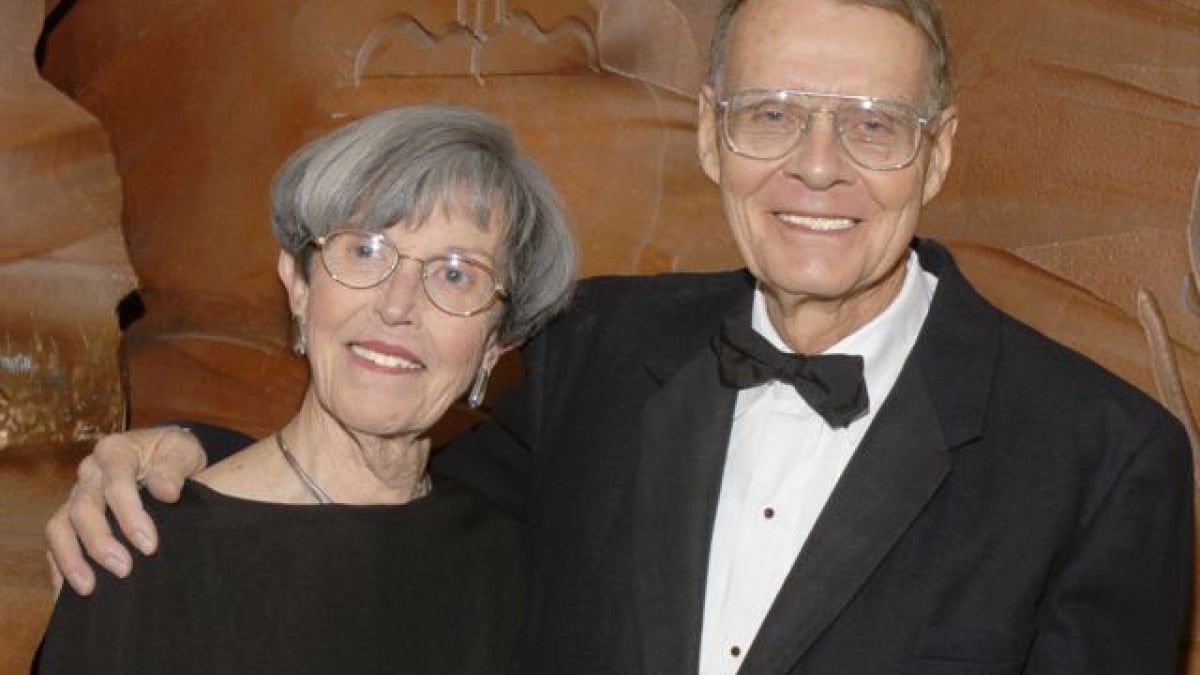Many people believe in the Golden Rule: "Do unto others as you would have them do unto you."
Few, however, adhered to that principle as closely as did David Lincoln, a successful entrepreneur and business owner known not only for his business acumen, but also for his unwavering commitment to advancing the common good.
Lincoln, who passed away March 16, spent his lifetime advancing the ideals of good behavior and good ethics through his personal example and through generosity to a breadth of causes, including higher education at Arizona State University. He was 92.
Together with his wife, JoanMFA '73, he helped establish ASU’s Lincoln Center for Applied Ethics, a hub and catalyst for research that advances a broad understanding of ethical behavior.
The Lincolns built upon their support for the Lincoln Center by establishing an endowment to support Lincoln professors and fellows across the university in a variety of disciplines, and an endowed chair in ethics, all designed to cultivate outstanding faculty with an interest in applied ethics; and the Lincoln Scholars program, which supports students who are committed to exploring the moral and ethical dimensions of complex societal challenges.
He sought to advance and uphold the values he exhibited as founder of Lincoln Laser, where in the 1970s he developed a precision cutting technology that was embraced by industries such as aerospace and agriculture.
When running his company, he adopted the guiding principles set by his father and mother, John C. and Helen Lincoln — founders of the John C. Lincoln Health Network of hospitals, medical facilities, physicians, and outreach programs across Arizona — to treat employees fairly.
“Good ethics is good business,” he would often say.
“David Lincoln changed our society for the better,” ASU President Michael M. Crow said. “His commitment to ethics, tolerance and respect, and to civic involvement shaped ASU’s vision to be a university that takes fundamental responsibility for the communities we serve. His belief that good ethics mean good business governs the aspirations of many students, faculty, and staff. ASU mourns his loss.”
The Lincolns' investments in higher education at ASU weren’t confined to ethics education. Their gifts, like their interests, spanned many arenas. Joan, who died in 2016, was an accomplished ceramicist who was active in the arts community.
The Lincolns supported ASU’s Ceramics Research Center and established the Joan R. Lincoln Endowed Professor of Ceramics at ASU. They also supported the ASU Art Museum, the SchoolThe School of Art, and the School of Film, Dance and Theatre are part of the Herberger Institute for Design and the Arts. of Art, and the School of Film, Dance and Theatre.
Other areas include the Center for the Study of Religion and Conflict, the Institute for Social Science Research, ASU Library, the W. P. Carey School of Business, the Sandra Day O’Connor College of Law, and the Thunderbird School of Global Management.
Their Chautauqua-Lincoln Travel Fellowship allows ASU students to attend the Chautauqua Institute in New York, where they explore educational, recreational, spiritual and artistic endeavors.
“For David, economic success was a path to generosity, and we are grateful that he and Joan saw ASU as a place where they could promote the values they held so dear,” said Gretchen Buhlig, CEO of the ASU Foundation.
“We see the impact of their generosity across our campus — in the arts, in business education, in the success of our students. And that impact grows as our graduates go out into the world and make a difference in their own communities. David and Joan truly did leave a legacy.”
A dedicated volunteer, Lincoln served as a trustee of ASU, where he embraced the university’s mission to execute its charter principles of accessibility, excellence and impact to the community. ASU trustees are advocates, advisors, and investors committed to the success of the university.
In addition to his support for higher education at ASU, Lincoln devoted extensive service to various boards and foundations across the Valley, including to the health network his family founded. Joan Lincoln served as Paradise Valley mayor, vice mayor and city councilmember.
More Law, journalism and politics

A new twist on fantasy sports brought on by ASU ties
A new fantasy sports gaming app is taking traditional fantasy sports and mixing them with a strategic, territory-based twist.Maptasy Sports started as a passion project for Arizona State University…

'Politics Beyond the Aisle' series to explore the stories of public officials
In an effort to build a stronger connection between students and political and civic leaders, Arizona State University’s School of Politics and Global Studies hosted the first event of its new series…

ASU committed to advancing free speech
A core pillar of democracy and our concept as a nation has always been freedom — that includes freedom of speech. But what does that really mean?Higher education doesn’t have an agenda to curate a…


